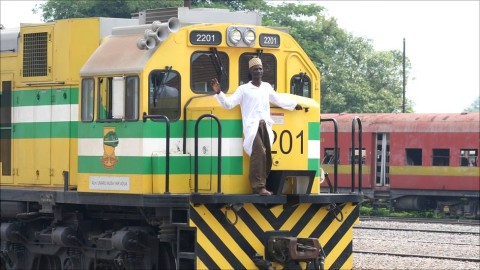OPINION: Railway Crime Against the East, By Emmanuel Onwubiko
Articles/Opinion, Featured, Latest Headlines Tuesday, May 23rd, 2017
(AFRICAN EXAMINER) – As little Children living in the North, precisely in Kafanchan, Kaduna State, the early eighties will remained evergreen in our memories for a combination of reasons amongst which is the usual Christmas periods’ train rides from our town of residence to the South East to enjoy the festivities.
In those years of yore, the Rail transportation used to play strategic role as the mainstay of public transportation for majority of the families who commutes from one end of this huge geographical entity called Nigeria to another.
These periods of Railway services also meant that the local economies of the towns hosting these railway facilities were boisterous and prosperous. Shops of different varieties sprang up within the vicinity of the Railway station even as businesses such as heavy haulages were seamlessly done through the railway networks at affordable rates.
Another good side of the thriving railway system then was that armed robberies whih have become the most disturbing phenomenon along the federal highways was not as high as they are now that the Railway transportation sector has since become moribund.
But progressively, due to bureaucratic corruption and gross mismanagement, the Railway transportation sector began to collapse particularly from the tail end of the eighties and around the middle of the 90’s it seemed like the Railway transportation totally collapsed.
Successive administrations did also not showed commitments to unbundle the Nigerian Railway Corporation to give it fair and profitable commercialisation and privatisation.
The Railway was all along used as a place whereby top government officials used as opening to create jobs for their cronies and bootlickers. The Nigerian Railway Corporation was used as the money spinner for officials of government who engages in inflating contracts and filling the staff nominal rolls with ghost workers. These trends have continued even with the advent of the current democratic experiment.
This is because righth from the inception of the democratic epoch in 1999, the successive administrations have made heavy weather of investing substantially in the rehabilitation and revamping of the moribund Nigerian Railway services but not much has happened to change the bad situation of the Railway transportation sector.
Since the Presidency of Olusegun Obasanjo till the immediate past administration of Dr Goodluck Jonathan there were reported efforts that were made to reposition the Nigerian Railway transportation to regain her pride of place.
If truth must be told only minimal gains were recorded by way of the restoration of skeletal resumption of railway services in places like Lagos and parts of the North. The South East of Nigeria and South/South were completely left out.
The immediate past administration also left some imprints by way of making concerted effort to speed up the revamping of the moribund railway corporation. But it appeared like the South East of Nigeria did not form the central area of focus because the bulks of these rehabilitation jobs were concentrated around the Lagos axis and the Northern cities like Kano and Kaduna. Much of the Southern crude oil bearing communities were also left without any plan to rebuild the moribund and ramshackled Nigeria Railway corporation.
But the larger question that still lingers is how the Nigerian Railway industry that thrived in the early 1980’s was left to rot to an extent that it had to depend on extra-budgetary releases by both the then Ibrahim Babangida and Sani Abacha administration to settle the arrears of staff salaries.
A transportation scholar Dr Umeh Christian Ikechukwu answered the poser by blaming mismanagement and bureaucratic corruption for the collapse of the Railway transportation sector. This scholar also recalled that during one of the military administrations some top hierarchies of the Nigerian Railway Corporation were sacked for corruption but ironically, the military Generals indulged in wanton looting of national financial resources. The ethical overhaul by way of mass dismissal of corrupt Railway officials was at best cosmetic and a mere dramatization. Dr. Ikechukwu recalled that the military despots like Babangida and Abacha doled out hundreds of millions as bailouts to the Railway for the payment of backlogs of salaries of staff that were mostly redundant.
Dr Ikechukwu also wrote a piece which gave credence to the trajectories of ‘developmental’ efforts made by the successive administrations geared towards achieving the objective of making the Railway system to work for Nigerians once more. He however faulted the entire efforts for lacking in deeper fundamental panaceas such as infrastructural overhaul and employment of committed professionals to run the sector as a profitable business venture.
- Ikechukwu said that the federal government of Nigeria has contributed meaningfully to the revival of the Nigerian Railway Corporation and the most prominent among these efforts in the past thirty years include In 1977, an agreement that was reached with rail India Technical and Economic Service Ltd (RITES) of India for it to help turn-around the Nigerian Railway Corporation and rail transportation in Nigeria within the next twenty years.
RITES, according to him recommended the installation of the standard railway gauge of 143mm to replace the present narrow gauge of 1067mm.
This was to be done in four phases, beginning from 1981 and ending in 1995.
Dr. Ikechukwu regrettably observed that Rites only tried the little it could do in order to improve on the revenue generation and management of the Railway Corporation without much structural change.
This foreign partner left after some years, leaving the corporation more impoverished financially.
But this writer didn’t remember to mention that the then administration failed to carry out forensic audits of the finance books of the Railway management.
He nevertheless stated thus: “In the month of November 1995, the federal government entered into a bilateral pact with the Chinese government for the purpose of revitalizing the Nigerian railway industry.”
“Under this agreement, experts from China Civil Engineering Construction Corporation (CCECC) were brought in to work with the management of the Nigerian Railway Corporation and the Federal Ministry of Transport for three years in the first instance, as part of a fifteen years railway reconstruction plan”, according to Dr Ikechukwu.
But he believes that most of the efforts of the government to revitalize the Nigerian rail transportation industry have failed to make any serious impact because none of the efforts have addressed the fundamental problems of the railway industry.
“The physical structure of the railway network, coaches; the need to be completely overhauled and the staff needs to be reoriented completely. These require bold steps and huge investment on the part of the federal governments”, he concluded.
Perhaps it was in a bid to address the funding gap left by the lack of investments in the Railway transportation sector that the current administration approached China as a follow up to a loan initiative that was on the pipeline or so it seemed before the March 2015 election which swept away the President Jonathan’s administration and brought in the Muhammadu Buhari’s administration.
The current administration however in seeking for this huge loan from a foreign jurisdiction has created unnecessary controversy by scheming out the whole of South East of Nigeria as a beneficiary of the Railway transportation sector’s revival scheme.
This is discriminatory and goes against the constitution in section 42 (1) which absolutely bans discrimination in the applications of federal or state government’s policies and programmes.
The explanation by the transportation minister Mr. Rotimi Chibuike Amaechi that the South East of Nigeria is part of the Railway plan with specific reference to invitation of private concessionaires doesn’t add up because it smacks of biases and favouritism that some sections of Nigeria would be carried along under the loan scheme only to scheme out the South East of Nigeria.
Therefore the decision of the Senators from the South-East geo-political zone, through its caucus chairman, Senator Enyinnaya Abaribe, to reject this naive and shallow explanation of the Minister of Transportation, Mr. Chibuike Amaechi on the deliberate omission of the South South, South East corridors of rail line development by the Federal Government is qualitatively sound.
Abaribe, according to news reports had raised the alarm that the South-South and South-East corridors were omitted in the $5.8 billion China Exim Bank loan, sourced by the Federal Government to develop rail lines across the country.
Amaechi had also countered and said the South-East was not excluded.
But South-East lawmakers, asked Amaechi to explain why the South East corridor was scheduled for concessionaires to build, while other rail line corridors in other parts of the country would be built with funds borrowed by the Federal Government which every part of the country would pay.
Reacting to a press statement issued by the Federal Ministry of Transport that the South East zone is not omitted as alleged by the Senate, as Aba and Onitsha are among towns covered by the Coastal Railway Corridor, the lawmakers who sponsored the motion in the Senate said: “Our motion is not only about the South-East, but about the second major railway corridor in Nigeria, built by the British, which covers South South-South-East-North Central and North East.
“The corridor is from Port Harcourt to Maiduguri, it covers over 100 towns and major cities, not about Aba or Onitsha, far from it. It industrialised many cities and gave jobs directly and indirectly to thousands.
“In addition, the letter from Mr. President seeking expedited action on approval of the loan did not specify when the eastern corridor would be modernised. It said negotiations are on to get a concessionaire for the eastern line. In other words, while we borrow for the western line, we must wait to get some entity interested to concession it.”
All rational thinkers must support the sound logic displayed in the statement credited to the Senate caucus of the South East of Nigeria which asserted that: “If it is our collective money saved out of our earnings, we can wait for the next season, but since it is collective debt, why don’t we endeavour to borrow enough and stimulate the growth of every region at the same period? Don’t you know that railways, more than any other infrastructure is critical to the growth of the economy? It is a big catalyst for the creation of jobs and creation of new towns.
“Besides, all those on the over 100 towns and villages served by the eastern line would suffer double jeopardy by paying twice. Once for the collective debt and also for the concession costs which would be borne solely by them”.
Senator Abaribe also affirmed thus: “What must be done now; It is my candid view that the Federal Ministry of Transport should approach the Chinese Exim Bank or any other source to raise the requisite funds to execute the Port Harcourt – Maiduguri Railway Corridor; what is good for the goose is good for the gander.
“When the Federal Government constructs the standard gauge for Lagos-Kano and leave the Eastern Corridor empty, how do we convince Boko Haram and IPOB boys that they are not marginalised and excluded?” the Senators asked.
Let the Nigerian Parliament redress this imbalance and outright fraud being planned against the South East of Nigeria and South South by the deliberate scheming out of these zones from the beneficiaries of the huge loan package from China. All sections of Nigeria must be carried along in the execution of Railway revival plans under the Chinese loans. I think credible groups of civil rights organisations should institute court cases to challenge this crime of marginalizing the South East of Nigeria and South South by the federal ministry of Transportation. Enough of these provocative acts of treachery and betrayal of certain sections of the country by the current government.
I think President Muhammadu Buhari and his Vice president Professor Yemi Osinbanjo now acting in the capacity of the President Protempore should also put measures concretely in place to ensure that the longstanding marginalization of the South East of Nigeria is not sustained.
It is a fact that the current administration has not only continued with the systemic exclusion of the South East from major federal government sponsored national projects such as Refineries and Roads networks but it has even taken it a notch further by excluding the South East of Nigeria from membership of the National Defence Council and other strategic military and paramilitary institutions and offices. This Railway crime against the South East of Nigeria is one too many and is totally intolerable.
*Emmanuel Onwubiko is head of the Human rights writers Association of Nigeria (HURIWA) and blogs @www.emmanuelonwubiko.com; www.huriwa@blogspot.com.
Related Posts
Short URL: https://www.africanexaminer.com/?p=39386






















